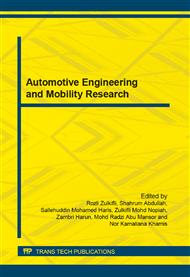p.504
p.510
p.517
p.522
p.532
p.539
p.547
p.552
p.557
Development of PROTON Electric Vehicle Control Unit (eVCU) Using State Machine Deterministic Rule-Based Approach
Abstract:
There are many types of Electric Vehicle (EV) applied in automotive industry. It can be hybridization or electrification vehicle. Battery Electric Vehicle (BEV) also called as fully electric vehicle using batteries as the only source and an electric motor as a traction motor to move the vehicle. In a world view of BEV, it is still has circumstances that would strand the BEV to have huge commercialization due to range anxiety. This paper is discussing about an electrification vehicle power and energy management (PEM) strategy. PEM strategy has two layer control strategies that consist of low level component control and high level supervisory control. Management and control strategy in BEV is carefully designed due to heavy loads consumption from Propulsion Electrical Load (PEL) and Non Propulsion Electrical Loads (NoPEL) with a single energy source. This is to ensure that power and energy is managed at optimum level that will give some extension of wider kilometer of the vehicle. The BEV performance is typically controlled by high level supervisory control algorithm using event-based condition using state machine deterministic rule-based method. More than one drive mode to be determined in this paper as part of control strategy to get an optimal PEM performance.
Info:
Periodical:
Pages:
532-538
DOI:
Citation:
Online since:
October 2014
Price:
Сopyright:
© 2014 Trans Tech Publications Ltd. All Rights Reserved
Share:
Citation:


